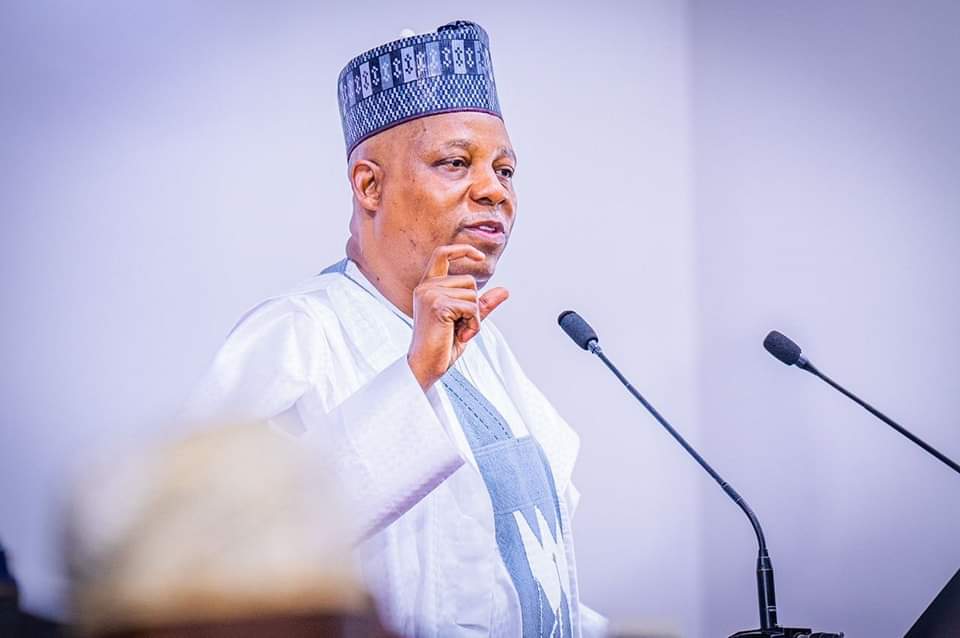…FG Confirms 40m Nigerians Affected by Desertification
Vice President Kashim Shettima has raised alarm over Nigeria’s worsening forest depletion, warning that the country is on the brink of an environmental and economic emergency that could cost it access to global markets and billions in untapped revenue.
Speaking at the 2025 Nigeria Forest Economy Summit in Abuja, themed “Sustainability of Nigeria’s Forests: Unlocking the $2 Billion Potentials for Economic and Financial Inclusion”, Shettima disclosed that over 90 percent of Nigeria’s original forest cover has been lost, with more than 400,000 hectares disappearing annually.
Represented by the Deputy Chief of Staff to the President (Office of the Vice President), Senator Ibrahim Hadejia, Shettima said, “This is not just an environmental crisis; it is an economic emergency.
We are standing at a crossroads where ignoring our forest resources further impoverishes our people and threatens our global relevance.”
He stressed the vast, largely untapped potential of Nigeria’s forests, which harbour biodiversity, timber, medicinal plants and economic opportunities.
Citing global models, the Vice President noted that Vietnam earns $15 billion yearly from forest products, Brazil’s Amazon contributes 15 percent of its GDP, while Ethiopia has created 350,000 jobs through forest-based value chains.
“Nigeria should not only replicate these models but lead Africa’s forest industrialisation,” Shettima declared.
He warned that new European Union regulations could bar imports of products from deforested land, potentially shutting Nigeria out of major global markets unless urgent action is taken to adopt sustainable forest practices.
The Vice President also highlighted the social impact, stating that over 70 percent of non-timber forest product collectors are women and youth.
“By empowering women-led cooperatives and youth enterprises, we democratise opportunity and lift millions out of poverty,” he said.
According to him, the federal government is working to harmonise efforts across more than 1,169 documented forests and 70,000 square kilometres of reserves through strategic investments.
“From an initial $500 million, we expect to unlock up to $3 billion in forest economy potential,” Shettima revealed.
He proposed creating eco-industrial parks focused on bamboo, shea butter, medicinal plants and carbon verification to drive economic growth. “Let us turn trees into trillions and forests into futures,” he urged.
Also speaking, Sadiq Sani, CEO of Netzence Sustainability Limited, said his company was deploying advanced modelling technology to measure forest emissions and unlock carbon credit opportunities.
“We are building tools that assess forest composition and its decomposition to determine carbon value,” he said, noting partnerships with the Presidency, Ministry of Environment, and Livestock Development Ministry.
Sani maintained that monetising carbon credits through data-driven analysis would provide not just environmental benefits, but economic and knowledge-based empowerment for Nigerians.
Minister of Livestock Development, Idi Maiha, in a goodwill message, linked sustainable forest management with livestock development.
He highlighted the administration’s year-old move to establish the ministry as a signal of renewed focus on rural development.
“Improved rangeland and forest management will reduce farmer-herder clashes, protect water sources, and promote climate-resilient livestock systems,” Maiha said.
He called for increased access to climate finance, credit, and insurance for smallholder farmers and promoted digital tools for land monitoring and livestock tracking to boost productivity and sustainability.
Maiha also pledged that his ministry would implement the summit’s recommendations in partnership with relevant stakeholders to harmonise livestock and forest conservation efforts.
Executive Secretary of the Border Communities Development Agency, George Kelly, said Nigeria possesses over 10.6 million hectares of forest land, which, if properly harnessed through carbon financing, could generate up to $6 billion annually.
“That amount can fund several state budgets. Properly managed, our forests can lift entire communities out of poverty,” Kelly stated.
Danny Sokari, chairman of WEN Synergies Nigeria Limited and a fellow of the Nigerian Institute of Architects, described the summit as a platform to awaken stakeholders to the forest economy’s potential.
He said the $2 billion opportunity was conservative and could rise to $10 billion with the right investments.
“We’ve exposed the coordinates and value of Nigeria’s forest economy. Now we must act with urgency,” Sokari said.
… FG Confirms 40m Nigerians Affected by Desertification
Meanwhile, in a related development, Minister of Environment, Balarabe Lawal, disclosed that over 40 million Nigerians have been affected by desertification and land degradation, which now affects 43 percent of the nation’s landmass.
Speaking during a national dialogue on the 2025 World Desertification and Drought Day, Lawal said Nigeria loses more than two million hectares of land annually to degradation, threatening food security and national stability.
He called for greater investments in sustainable land and forest management to mitigate climate change, economic hardship and water scarcity.
The Vice President, ministers, and stakeholders concluded the summit with a strong call to align policy, technology, finance and grassroots mobilisation to preserve Nigeria’s forests as a national economic pillar.
“Our forests are not relics of the past. They are the blueprint for our economic future,” Shettima declared.
Do you want to share a story with us? Do you want to advertise with us? Do you need publicity for a product, service, or event? Contact us on WhatsApp +2348183319097 Email: platformtimes@gmail.com
We are committed to impactful investigative journalism for human interest and social justice. Your donation will help us tell more stories. Kindly donate any amount HERE




